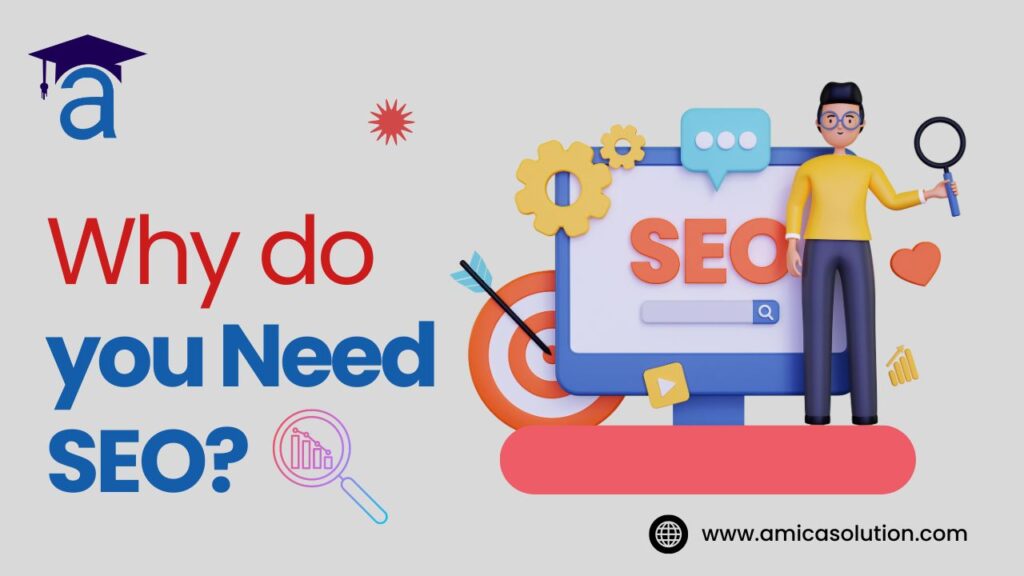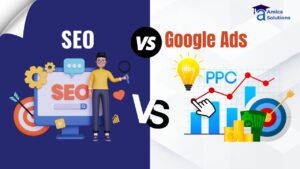
Best Top Digital Marketing Company in Dehradun
Best Top Digital Marketing Company in Dehradun The Search for a Premier Digital Marketing Service in Dehradun: Why It Matters Dehradun isn’t just about hills,

Would you like to rank your website on the first page on google, that’s might be the reason you’re reading this blog, then a good Seo is the only way to do so. In this blog we will discuss, what is Seo, its importance and benefits of good Seo.
SEO is the magic ingredient that helps your website climb the ranks of search engine results pages (SERPs).
Think of it as the process of fine-tuning your website’s content, structure, and overall online presence to make it more attractive to both search engines and users alike. By optimizing various aspects of your site, you increase its visibility and chances of appearing at the top of search results when someone looks for relevant information or products.
There are several key techniques involved in SEO:
So, why should businesses invest time and resources into SEO? Here are some good reasons:
SEO is a multifaceted process that encompasses several key elements:
Keyword Research and Planning: Understanding the language your audience use is important for targeting the right keywords and creating content that resonates with them.
Content Development and On-Page SEO: Creating high quality, relevant content is essential for both users and search engines. On-page SEO techniques help optimize this content for better visibility.
Off-Page SEO: This includes activities like link building, social media marketing, and influencer outreach, all aimed at increasing your website’s authority and credibility in the eyes of search engines.
Technical SEO: Optimizing technical aspects of your website, such as site speed, mobile-friendliness, and crawlability, ensures that search engines can index and rank your site effectively.
Local SEO: If your business has a physical location or serves a specific geographic area, local SEO tactics can help improve your visibility in local search results.
Google’s Role in SEO
Google dominates the search engine market, so understanding how it delivers search results is key to SEO success. Factors like relevance, quality, usability, and context all play a role in determining where your site ranks in Google’s search results.
The Significance of Keyword Research
Keyword research forms the foundation of any successful SEO strategy. By targeting the right keywords, you can attract relevant traffic to your site and create content that addresses the needs and interests of your audience.
Content Development and On-Page SEO
Creating high-quality, relevant content is essential for SEO success. By incorporating target keywords naturally into your content and optimizing on-page elements like titles, headings, and meta descriptions, you can improve your chances of ranking higher in search results.
The Role of Off-Page SEO
Off-page SEO activities like Backlinks play an important role in building your website’s authority and credibility. By earning links from other reputable sites, you signal to search engines that your content is trustworthy and valuable.
The Importance of Technical SEO
Technical SEO ensures that your website is optimized for factors like site speed, mobile-friendliness, and overall user experience. By addressing technical issues and making your site more accessible to both users and search engines, you can improve your SEO performance.
The Benefits of Local SEO
Local SEO is especially important for businesses with a physical presence or those targeting specific geographic areas. By optimizing your website for local search, you can attract more customers from your local area and improve your visibility in local search results.
In summary, SEO offers a wide range of benefits for businesses, including:
In summary, SEO offers a wide range of benefits for businesses, including:
By following SEO best practices, such as creating high-quality content, optimizing your website for search, and building authoritative links, you can improve your overall marketing performance and achieve long-term success online.
Finally, one of the great things about SEO is that it’s highly quantifiable.
Tools like Google Analytics allow you to track metrics such as organic traffic, conversions, keyword rankings, and position changes, giving you valuable insights into the effectiveness of your SEO efforts.
In conclusion, SEO is a critical component of any successful online marketing strategy. By optimizing your website for search engines and providing valuable content to your audience, you can improve your visibility, drive more traffic to your site, and ultimately grow your business in the competitive online marketplace.

Best Top Digital Marketing Company in Dehradun The Search for a Premier Digital Marketing Service in Dehradun: Why It Matters Dehradun isn’t just about hills,

What Is Off-Page SEO and Why Is It Important? (Beginner’s Guide to Building Authority & Rankings) Here’s a wild one: According to Moz, backlinks are

How Digital Marketing Helps Local Businesses Grow: Strategies That Work in 2025 Let’s be honest—running a local business today is a whole different compared to

SEO vs. Google Ads: What’s the Better Long-Term Strategy? You’ve probably heard this debate a hundred times already: SEO vs. Google Ads—which one actually works

Best SEO Practice for 2025: Future-Proof Strategies to Boost Your Rankings Let’s be honest — SEO isn’t what it used to be. If you’re still

Top Social Media Statistics Every Marketer Should Know in 2025 Social media has become an indispensable pillar of modern marketing. Its vast reach and ability